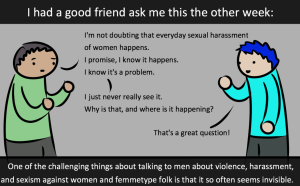
Credit: Made Man
Bear and I were having a disagreement. I thought he was being ridiculous. I thought he was reacting disproportionately. He was getting so upset over nothing. He was hurt over something that didn’t even matter.
“It doesn’t matter,” I told him. “Just get over it.”
“I hate it when you say that,” he said. “Because it really does matter to me.”
“But it shouldn’t,” I said.
“But it does.”
“But it shouldn’t. Can we just talk about something else?”
“Sometimes you act like it’s my fault, when I’m upset, instead of trying to make me feel better.”
Yes. Guilty. I do this. I totally do this.
And I have no right to do it. Because actually, I don’t have the world figured out.
You seem surprised.
In fact, it has taken me several years to figure out how to make delicious cauliflower. Do you know how hard it is to make cauliflower delicious? Before I figured it out, I baked it in tinfoil and sautéed it with garlic and olive oil and puréed it and made mashed potato cauliflower. And some of those were good, but they weren’t delicious. It was a long road. And that’s just cauliflower.
People have told me to “get over it” a lot, since I started writing about body image. It’s not too surprising. People have told the women who write about body image and “women’s issues” to get over themselves for centuries. I’m probably in good company.
People usually tell me to “get over it” when I’m being vulnerable and insecure. When I’m admitting my own weaknesses and fears.
This is often the time when the phrase “get over it” pops up. When someone is afraid, and someone else thinks they shouldn’t bother. When someone feels bad, and someone else isn’t interested in their feelings.
“Get over it” is a cruel phrase. It means, “Not only do I not care about how you feel, if you were smarter, you wouldn’t care either.”
“Just get over it” places all of the responsibility on the person being told, and establishes the teller as the authority. It liberates the teller from any obligation to listen.
And people not listening is usually where things go wrong.
I’m reasonably sure that if people listened better, some of the bigger issues (the ones we can pretty much all agree are important)– like war, crushing poverty, national debt, global hunger, systemic violence, racism, oppression, and the music that plays after the robot voice goes “We appreciate your call! Please hold for the next available representative!” — would be improved on too.
And that’s not just being mushy and foofy and full of adorable hope and baby bunnies. People need to listen to each other. For real.
But aside from averting global crises and bringing a great and lasting peace to all the lands, listening to other people does something else. It teaches you that anything is important, as long as it’s important to someone.
Maybe that’s shocking. Maybe it just sounds wrong.
We want to rate and rank and categorize everything so badly, that sometimes we forget that it’s not the ladder that matters, it’s the people climbing it.
Just because you don’t think something is meaningful doesn’t mean that someone else feels the same way. And this is the really hard part: you are not right.
You are not right about what someone else should care about. You don’t know. You can’t possibly know. You are not in a position to judge. And even if you were, you would be wrong to tell them to “get over it,” as though “getting over it” were something that could be done in a moment.
I haven’t figured much out, but I do know this: getting over something is not a single act. It’s a relationship.
If you work at moving through something, you have to interact with it. You have to touch it. You have to dive in and get wet. “Come on,” yell the people who think they know, prodding you impatiently, “Get in the ‘get over it’ boat! Just go across!” But the “get over it” boat has so many holes that you will end up sinking in the middle, betrayed and unprepared.
I, for one, am not willing to climb aboard.
There are some things that I am not over, and I am want to face them, instead of ignoring them.
I am not over the huge pressure placed on women to be thin. I am not over the beauty standards that have been imposed on me since I was a little girl. I am not over wrestling with food. I’m not over how food is too often shameful. I am not over the way sex appeal gets reserved for certain people and other people aren’t sure they’ll ever be sexy. I am not over the way little girls are taught to relate to their bodies. I am not over questioning the way womanhood should work for me. I am not over questioning the way womanhood gets defined in the first place. Some days I am not over my own face.
And I am not sure I want to be over all of these things. The world needs people who aren’t over themselves. Who are still talking. Who are still protesting. Who are still not sure.
Some days, I see how far I’ve come. I am right in the middle of all this, but I am moving towards the other shore.
The people who tell me to “get over it” are not over something else. It might actually be exactly the same thing that they’re snapping at me to get over. They might be paddling frantically as the water seeps in, chins up, smiles glued to their faces.
So let’s stop telling other people to “get over it.” We don’t know why they should. And when other people tell us to get over something, let’s say, “No.” And then let’s remember that they don’t understand the world any better than we do, they just feel more comfortable not trying to. They probably don’t even know how to make delicious cauliflower.
It turned out that Bear was upset about something that mattered. Something that I could understand, when I took the time to listen.
Afterward, I wondered why I’d thought it could be any other way.
When’s the last time someone told you to get over it? Share in comments below!
Kate Fridkis blogs at Eat the Damn Cake. You can follow her on Twitter or check out thepictures of women eating cake that people send her.
Search our 3000+ articles!
Read our articles about:
Our online racial justice training
Used by hundreds of universities, non-profits, and businesses.
Click to learn more




















